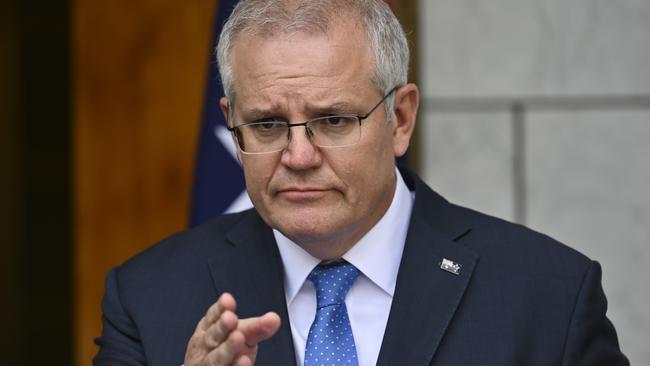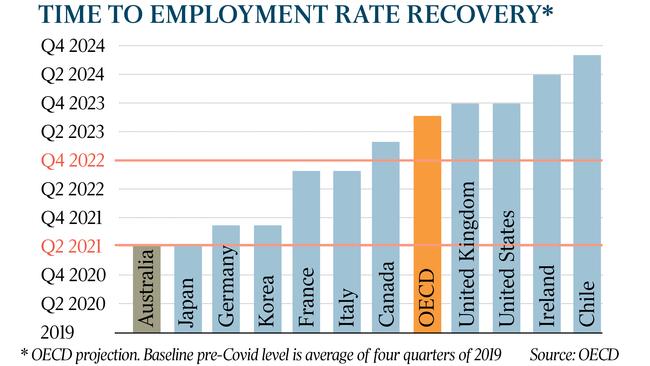Australia praised by OECD for leading way on jobs recovery
The Morrison government’s emergency income support to workers and businesses last year has been lauded by the OECD.

The Morrison government’s emergency income support to workers and businesses last year has been lauded by the OECD, with Australia’s rapid employment recovery now leading its rich-country peers by several years.
While Australia and Japan regained pre-pandemic employment rates in the June quarter, the Paris-based body expects the US and UK to amble to that point by the end of 2023.
In its annual Employment Outlook, released on Wednesday, the OECD finds Australia at the top of the class in heading off the worst effects of the pandemic’s hit to health, jobs and output, despite “slow progress in its vaccination campaign”.
It singles out the $89bn JobKeeper scheme as a success and urges the government to evaluate its performance to see whether a permanent version of the wage subsidy would help firms in distress.
But the OECD concludes the world faces a slow climb to regain the jobs lost in the crisis, anticipating growing income inequality, scarring of young workers, and job losses due to technological innovation.

“The unprecedented scope and scale of state support for reviving and reinvigorating our economies is a source of hope,” the report said.
“Now we have a unique opportunity for bold labour market and social policies to avoid locking in inequality and exclusion as a legacy of the crisis”.
In May, there were still 22 million more jobless people in the OECD area than before the Covid-19 crisis, while globally 114 million jobs had disappeared.
OECD director for employment, labour and social affairs Stefano Scarpetta said governments should use the opportunity of looser budgetary conditions and low borrowing costs to become more interventionist.
“Policies to build a more productive, rewarding, greener and inclusive world of work require adequate financial resources – in particular for strengthening active policies, lifelong learning, and social protection,” he said.
“Before the crisis, often strict constraints on public finances made financing this transition a difficult endeavour. More resources are available now. A window of opportunity is opening. Let us not waste it.”

Former finance minister Mathias Cormann, who led the Coalition’s fiscal consolidation from 2013 until his retirement last year, began his role as OECD secretary-general last month.
The report notes Australia’s employment rate fell by 3 per cent in the June quarter last year, compared to the OECD average of 4.9 per cent, while the loss of hours worked by May last year here was relatively small compared with the US, Canada and Britain.
“A rapid and substantial initial policy response and strict containment measures have contributed to Australia’s swift labour market recovery, despite slow progress in its vaccination campaign,” the report’s country notes said. “Australia successfully ran a job-retention scheme that helped support a large number of jobs during the Covid-19 crisis. By April/May 2020, 30.5 per cent of workers were employed on the scheme.
“Given the improvement of the health and economic situation, the scheme has now ended. A careful evaluation of its strengths and limitations would offer valuable insights on whether the Australian labour market might benefit from a structural scheme to help support firms facing temporary difficulties”.
The unemployment rate returned to pre-pandemic levels of 5.1 per cent in May, with the number of people employed now at a record high, while the end of JobKeeper in late March caused only a small fraction of the 150,000 job losses Treasury had anticipated.
The report said at the peak of the crisis, job-retention schemes supported about 60 million people in OECD countries, or 20 per cent of all jobs, which was more than 10 times as many as during the global financial crisis.
By early this year the take-up had fallen to 6 per cent, with estimates suggesting the schemes saved up to 21 million jobs.
“Going forward, support should be maintained in sectors where activity remains restricted but should be more targeted to viable jobs in sectors that can resume,” the OECD noted.
The Morrison government used training and hiring credit policies to ease long-term and youth unemployment and mitigate the pain of structural adjustment. The $4bn JobMaker hiring credit included in last October’s budget, however, was poorly subscribed by companies.
The OECD said additional investments in labour market programs were essential to support large numbers of jobseekers moving from declining to growing sectors, to assist companies to retain and recruit staff, and to provide individual support to particularly vulnerable people.
“Australia increased funding over four years to provide extra support to individuals affected by the crisis,” the country notes said.
“In addition, it offered funding to enhance digital services for jobseekers to compensate for reduced in-person service. Additional training programs were offered, training was moved online and training places were expanded to ensure individuals could continue to improve their skills in order to be ready for their next job”.
On Tuesday, Reserve Bank governor Philip Lowe said the economy “has bounced back earlier and stronger than expected”, and highlighted the ongoing strength of the labour market.








To join the conversation, please log in. Don't have an account? Register
Join the conversation, you are commenting as Logout